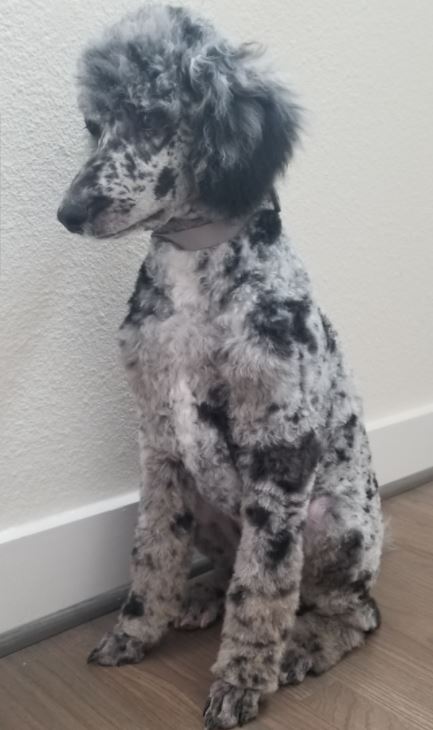What is a Merle Poodle?
Merle is not the color of the poodle, you can consider it a coat pattern. The “merle gene” is actually a dilution gene. It dilutes random darker patches of the coat to lighter colors.
Some areas appear light (grey) while other areas still have the intended original coat color.
This in turn gives an attractive appearance of patches all over the Poodle coat. These patches are usually of any size and shape and can appear anywhere on the body.
The merle gene mainly affects Poodles of a particular coat color specifically the eumelanin type. This eumelanin Poodle group comprises dogs with these coat colors:
- Black
- Liver
- Blue
- Isabella
Any area of the body (coat, nose, eyes) with these colors can appear as merle if the gene is present. These markings can appear as a mask (face), brindle mark, saddle, or the whole body!
Merle does not affect Pheomelanin (Red Poodle). The merle pattern effects are not visible on Red Poodle dogs, except in rare cases.
Double Merle Poodle
Occasionally, a Poodle will receive a Homozygous Merle gene (MM). In this case pigments are likely to be completely missing from vital areas such as the eye and the ear. This is what drastically increases the chances of deaf and blind merle Poodle puppies.
Regular merle Poodles bear the Heterozygous Merle gene (Mm) which is why they still have pigments in their eyes and ears. This lowers their chance of being blind and deaf, but it is still possible.
Health Issues Associated With Merle Poodles
Is having a fancy merle Poodle worth the associated health risks?
Unlike the Merle German Shepherd, the Merle Poodle does come with a variety of health concerns that could easily decrease the life expectancy of your pet dog.
The most common risks of merle Poodles include:
- Blindness
- Deafness at birth (due to lack of pigments in the ear)
- Skin sensitivity
- Cancer (increased risk of developing cancer)
Merle Poodle Dogs Are Not Natural!
Merle pattern is not a pattern that occurs naturally in the Poodle dog breed. Being a semi-dominant gene, not a recessive gene, it is evident that the “Merle” gene was artificially introduced into the Poodle breed.
This introduction of the gene may have been done by crossing. The merle gene probably came from the dog being crossed with a Poodle. To create this ‘designer merle Poodle’ several generations must have been bred.
Dogs who naturally have the merle gene include:
- Australian Shepherd
- Catahoula Leopard Dog
- Norwegian Dunker
- Border Collie
- Hungarian Mudi
- Cardigan Welsh Corgi
- Shetland Sheepdog
- Dachshund
- Beauceron (known as Harlequin)
- Bergamasco
- Pyrenean Shepherd
- Great Dane
Should a Poodle Have Blue Eyes?
A Poodle dog does not naturally have blue eyes. Instead, they are known to have dark eyes (brown, liver).
Merle Poodle dogs have all or partly blue eyes while their noses are all or partly pink.
We would not recommend this dog to be adopted for two reasons. He is quite likely to be deaf, blind, or both. We should not in any way help unscrupulous breeders.

How Rare is a Double Merle Poodle?
A double merle Poodle is created by breeding a merle Poodle with another merle one.
Only some designer dog breeders tend to breed dogs based on their appearance and their popularity with little regard for their health (genetic diseases). Hence it is quite rare.
But generally, this practice is a risky one that many good purebred breeders consider dangerous to the dog’s overall health.
This is possibly the reason why the AKC and UKC do not recognize the merle Poodle.
FAQS
Are Merle dogs unhealthy?
Merle dogs cannot be called unhealthy. Dogs with a single merle gene can lead their life normally. Only when the dog receives two merle genes, they become quite prone to severe illnesses like deafness or blindness.
Should you get a merle Poodle?
Although their appearance is rather tempting and it would be nice to own such an attractive dog, the health risks are real!
A merle Poodle with health issues may come with special needs that an owner must commit to. So, think twice before adopting a merle Poodle!

